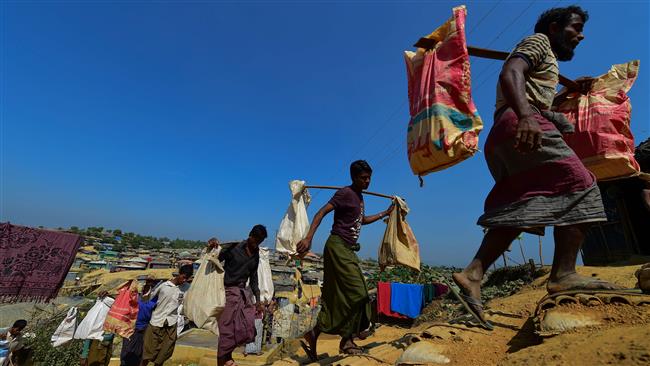
RNA - The Taung Pyo Letwe refugee camp, built by Myanmar outside the town of Maungdaw in Rakhine State and near the Bangladeshi border, consists of long, plywood structures constructed on a rocky field and surrounded by a wire mesh fence topped with barbed wire.
The UN refugee agency, the UNHCR, on Wednesday called on Myanmar “to allow the necessary unhindered humanitarian access in Rakhine State and create conditions for a genuine and lasting solution.”
It said that “there are continued restrictions on access for aid agencies, the media and other independent observers” in Myanmar.
Rohingya Muslims have faced horrific violence at the hands of the Myanmarese military and extremist Buddhists in Rakhine. Many have fled to Bangladesh, where they live in squalid camps; others have remained trapped in Rakhine.
But under a deal between Bangladesh and the Myanmarese government, those who have taken shelter in Bangladesh face repatriation.
The UN children’s agency said on Wednesdays that necessary safeguards for the refugees were still missing.
“Until the safety and well being of any child returning to Myanmar can be guaranteed, talk of repatriation is premature,” UNICEF Deputy Executive Director Justin Forsyth said in a statement.
While Myanmar insists it has prepared the conditions for the return of the Rohingya refugees, the Muslims in Bangladesh say their lives will be in danger back in Myanmar. The refugees say they will only return to their villages if there is strong monitoring by outside organizations.
“How can we go back to Myanmar without anyone guaranteeing our security?” said one Rohingya Muslim in the Bulakhali refugee camp in Bangladesh.
The UN says nearly 655,000 Rohingya Muslims have fled Rakhine to Bangladesh since the military launched a new wave of bloody violence last August.
The agreement reached between Bangladesh and Myanmar to return the refugees was expected to launch on Tuesday but has been postponed. Myanmarese officials said on Tuesday that the potential returnees hadn’t completed the forms Myanmar had provided attesting to their former residency in their home country; therefore, Bangladesh cannot begin their repatriation. Only refugees with identity documents — which most Rohingya lack — will be allowed back into Myanmar.
Buddhist-majority Myanmar brands the minority Rohingya Muslims in the country as “illegal immigrants” from Bangladesh, refusing to accept them as citizens despite the fact that they have lived in the country for many generations.
Government troops and Buddhists have been committing killings and rapes, making arbitrary arrests, and carrying out arson attacks in Muslim villages in Rakhine. The government also bans human rights monitors and independent journalists from entering the troubled state.
Bangladesh, too, denies the Rohingya citizenship and has threatened to cut their food rations if they refuse to leave.
847/940